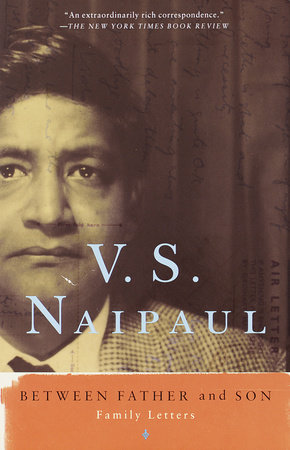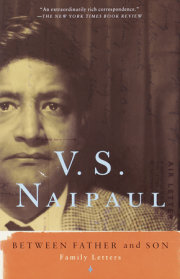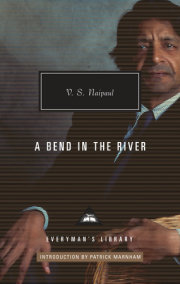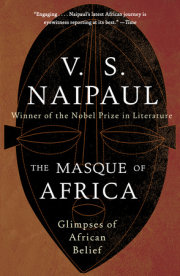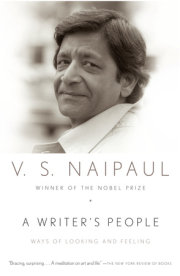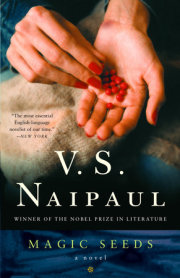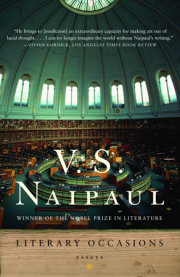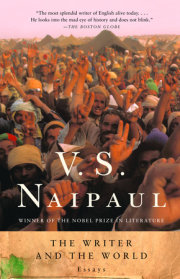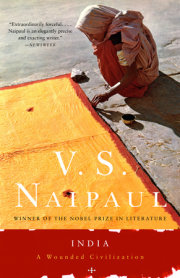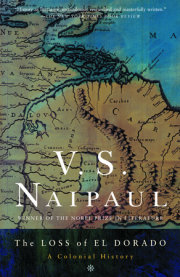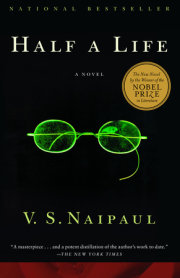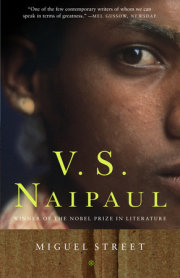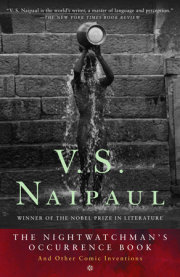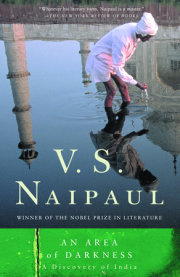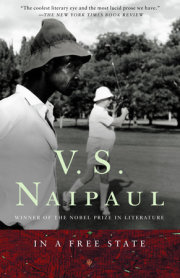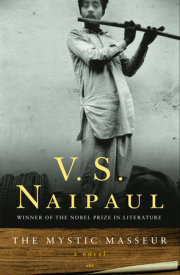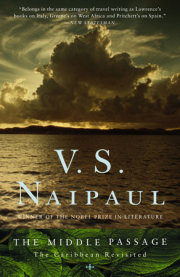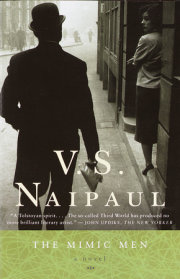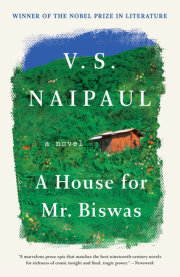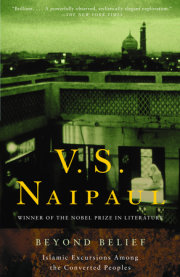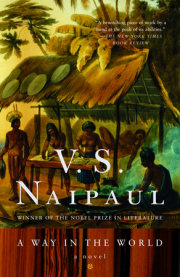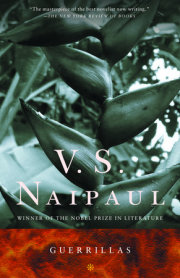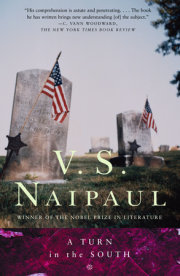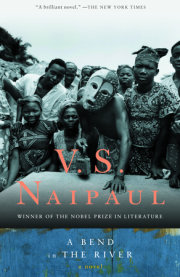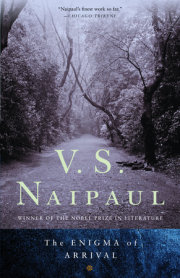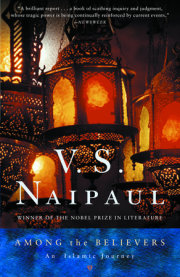I September 21, 1949 – September 22, 1950 Port of Spain to Oxford
Trinidad September 21, 1949 Dear Kamla,*
I wonder what is the matter with this typewriter. It looks all right now, though. I am enclosing some cuttings which, I am sure, will delight you. You will note that I went after all to the Old Boys’ Association Dinner. I can count those hours as among the most painful I have ever spent. In the first place, I have no table manners; in the second, I had no food. Special arrangements, I was informed after the dinner, had been made for me, but these appeared to have been limited to serving me potatoes in various ways—now fried, now boiled. I had told the manager to bring me some corn soup instead of the turtle soup that the others were having. He ignored this and the waiter brought up to me a plateful of a green slime. This was the turtle soup. I was nauseated and annoyed and told the man to take it away. This, I was told, was a gross breach of etiquette. So I had bread and butter and ice-cold water for the first two eating rounds. The menu was in French. What you would call stewed chicken they called ‘Poulet Sauté Renaissance’. Coffee was ‘moka’. I had rather expected that to be some exotic Russian dish. Dessert included something called ‘Pomme Surprise’. This literally means ‘surprised apple’, and the younger Hannays,† who was next to me, told me it was an apple pudding done in a surprise manner. The thing came. I ate it. It was fine. But I tasted no apple. ‘That,’ Hannays told me, ‘is the surprise.
I have just finished filling out the application forms for entrance to the University; I had some pictures of myself taken. I had always thought that, * V(idiadhar) S(urajprasad) Naipaul’s elder sister, then studying at Banares (also spelled Benares) Hindu University. The eldest of the seven children born to Seepersad and Droapatie (née Capildeo) Naipaul (see Family Trees)
† Fellow pupil, son of a distinguished black lawyer in Trinidad
though not attractive, I was not ugly. This picture undeceived me. I never knew my face was fat. The picture said so. I looked at the Asiatic on the paper and thought that an Indian from India could look no more Indian than I did. My face would give anyone the idea that I was a two-hundred-pounder. I had hoped to send up a striking intellectual pose to the University people, but look what they have got. And I even paid two dollars for a re-touched picture.
I am all right. I am actually reading once more. I decided to start preparing myself for next year by a thorough knowledge of the nineteenth-century novel. I read the Butler book;* I think it is not half as good as Maugham’s Of Human Bondage. The construction is clumsy. Butler has stressed too much on passing religious conflicts; is too concerned with proving his theory of heredity. I then went on to Jane Austen. I had read so much in praise of her. I went to the library and got Emma. It has an introduction by Monica Dickens, which extolled the book as the finest Austen ever wrote. Frankly, the introduction proved better reading than the book itself. Jane Austen appears to be essentially a writer for women; if she had lived in our age she would undoubtedly have been a leading contributor to the women’s papers. Her work really bored me. It is mere gossip. It could appeal to a female audience. The diction is fine, of course. But the work, besides being mere gossip, is slick and professional.
I think you would be interested to know how my $75 will be spent. I have taken over all your debts. $50 will go to the bank; $10 to Millington;† and $15 to Dass. I have about two dollars pocket money. I get this from Mamie‡ for teaching Sita.§ Sending that child to school to get an academic education is a waste of time and money. She is the most obtuse thing I have ever met. If you want to break a man’s heart, give him a class of Sitas to teach. I wonder if you know that I have been teaching George.** He is dull but could pass if made to work hard. I am sure you will be glad to know that * Samuel Butler’s The Way of All Flesh (1903)
† Occasional Naipaul family servant
‡ Mamie (or Mamee): V. S. Naipaul’s maternal aunt by marriage, wife of Simbhoo, the elder of his mother’s two brothers (Capo S.)
§ V. S. Naipaul’s cousin, Mamie’s daughter
** V. S. Naipaul’s cousin, son of his father’s elder brother, Persad (or Ramparsad—and fictionalised by his father as ‘Rapooche’)
Jainarayan* is making splendid progress. Those people are a sorry lot. This devaluation business is going to make it even harder for them.
It is not for us at home to do extensive writing; that is your job. It is you who are seeing new countries, having new and exciting experiences which will probably remain in your memory as the most interesting part of your life. I must say, however, that your letters have improved enormously. I wonder why. Is it because you are writing spontaneously, without any conscious effort at literature? I think it is.
While you are in India, you should keep your eyes open. This has two meanings: the subsidiary one is to watch your personal effects carefully; the Indians are a thieving lot. Remember what happened to the trousers† of the West Indian cricket eleven. Keep your eyes open and let me know whether Beverly Nichols‡ is right. He went to India in 1945, and saw a wretched country, full of pompous mediocrity, with no future. He saw the filth; refused to mention the ‘spiritualness’ that impresses another kind of visitor. Of course the Indians did not like the book, but I think he was telling the truth. From Nehru’s autobiography,§ I think the Premier of India is a first-class showman using his saintliness as a weapon of rule. But I am sure it has a certain basis in fact. Huxley may have degenerated of late into an invalid crippled by a malady that has received enormous approval by the intellectuals—mysticism—but what he said in his book** about India twenty years or so ago is true. He said that it was half-diets that produced ascetics and people who spend all their time in meditation. You will be right at the heart of the whole cranky thing. Please don’t get contaminated; I will be glad when your three years will be finished; then you could breathe the invigorating air of atheism. (I don’t like that word. It seems to suggest that the person is interested in religion; it doesn’t suggest one who ignores it completely . . .)
I suppose that by now you have received the ten pounds. We got your diary. I could sense an underlying unhappiness and worry in it. I don’t * V. S. Naipaul’s cousin, his maternal aunt’s son
† The white flannel trousers of the West Indian cricket team visiting India at this time were famously stolen in Bombay
‡ Beverly Nichols’ Verdict on India (1946) had occasioned much controversy
§ Autobiography (1936)
** Aldous Huxley’s Jesting Pilate (1926)
think you were completely happy. I could imagine how glad you were when you saw Boysie* at Avonmouth. After all, who could be perfectly happy going to a strange land with only about seventy dollars to stay heaven knows how long? I doubt whether we could have stood the financial strain. I am very glad how things turned out.
I will write shortly. Goodbye and good luck.
With affection,
Vido†
[To Kamla] Trinidad October 10, 1949
My dear little fool,
You are the damnedest ass. Your letter amused me as I read the first few lines; then it became grotesque.
You are a silly stupid female, after all. I fancy you rather enjoyed writing that plea to a wayward brother. It made you a hero à la Hollywood. Listen, my dear ‘very pretty’ Miss Naipaul, you are free to indulge your fancy, and let it roam, but don’t ever mix me up in it. I appreciate that the picture of an intelligent, sensitive (‘he is the most sensitive of all your children’) brother flinging himself at the dogs, as it were, eating out his heart, and drowning his sorrows in drink, at the departure of a dear sister is appealing and not without its melodramatic flavour.
You were the same over here. Do you remember your taunts at my getting a job? You enjoyed the picture you built up, the picture someone would form of me if he knew nothing of the family. A weak, bespectacled brother is frustrated by his lack of physical attraction. It grows on him, for he is intellectual, and he becomes a drunkard. He is easily led astray; when he falls for vices, he falls hard. The sister knew it all the time. She weeps as a fountain as she pens the bitter letter to her brother, inquiring if what she * Boysie (or Boyzee): cousin, maternal aunt’s son
† An intimate form of Vidia (itself a diminutive of Vidiadhar), the name by which V. S. Naipaul was and is familiarly known
hears is true, half hoping to hear that it is. You are a fool. He is easily led astray. Living in a family where generosity is bad business; where mediocrity and stupidity hold sway; where meat-eating is a virtue—he is ungenerous, he is stupid, he eats meat.
Am I easily led astray? Probably. By you. I could have, with profit, spent my money on myself. I always admire the human ability to forgo a pleasure, after that pleasure has been enjoyed.
If I smoked in Trinidad you well knew how I was at pains to hide the fact from you! Why didn’t the ass tell me who was the slandering malicious ‘friend’ who had my welfare so much at heart?
You have insulted me, Kamla. This is going to be my last letter to you. I am easily led astray! Not you, who are fool enough to believe what one ass has said. This could have been entertaining, but you went all out to play the Hollywood role. At other times you kept us without letters for nearly three weeks. Now you dispatch three sermons. Vido is going to the bad. Stop him! He can’t help himself, poor thing. Then the one to me: ‘You want me to be happy. But how can I?’ All this is very fine. Leave me out in future of all your daydreams. Try them on some English or Asiatic ass.
For three weeks past, I have been smoking. As much as with Springer and Co.* when you were here. That is bad, isn’t it? I have been drinking excessively? Well, yes, water. It has been very hot. Listen, what have you people got against Owad?† I can tell you, Miss Hollywood, he is not a whit worse than any of your cousins. Of course, this will confirm, in your mind, the fact that I have gone to the dogs. But I don’t give a damn what you think now. You have insulted me in the worst manner possible.
V. S. Naipaul * Schoolfriends
† Cousin, Vidia’s mother’s sister Dhan’s son
Miss Kamla Naipaul, Women’s Hostel, Banaras Hindu University, Banaras, India
Trinidad November 24, 1949
My darling,
I want you to promise me one thing. I want you to promise that you will write a book in diary form about your stay in India. Try to stay at least 6 months—study conditions; analyse the character. Don’t be too bitter. Try to be humorous. Send your manuscript in instalments to me. I will work on them. I am getting introductions to quite a number of people— Pagett of Oxford included. Pa can put me on to Rodin, the star-writer of England’s Daily Express. Your book will be a great success from the financial point of view. I can see it even now—My Passage to India: A Record of Six Unhappy Months by Kamla Naipaul.
Don’t take everything in such a tragic way. I can’t imagine how a girl like you so fond of laughter can’t see the hilarious stupidity of the whole thing. If you go ahead taking everything to heart, your whole life will be just one lament.
But let us consider you—from the practical point. I have already paid back $150, and, by December, $200 shall be struck off. Not bad, eh? If you can’t take it—tell your uncle* in London. Find out if his offer still holds good. I trust you are keeping in touch with Ruth.† If he says no, well, we’ll see then. How much money have you in the bank?
Has the damned Gov’t sent you your allowance?
My stay in Trinidad is drawing to a close—I only have nine months left. Then I shall go away never to come back, as I trust. I think I am at heart really a loafer. Intellectualism is merely fashionable sloth. That is why I think I am going to be either a big success or an unheard-of failure. But * Vidia’s mother’s younger brother, Rudranath (Capo R.), at the time a Lecturer in Mathematics at London University
† Rudranath’s wife, Vidia’s aunt by marriage
I am prepared for anything. I want to satisfy myself that I have lived as I wanted to live. As yet I feel that the philosophy I will have to expand in my books is only superficial. I am longing to see something of life. You can’t beat life for the variety of events and emotions. I am feeling something about everything—about this amusing and tragic world.
I have found it difficult to live up to my own maxim. ‘We must be hard, I say. ‘We must ignore the pain-shrieks of the dying world,’ yet I can’t. There is so much suffering—so overpoweringly much. That is a cordial feature in life—suffering. It is as elemental as night. It also makes more keen the appreciation of happiness.
Please write to me only how sad you are.
There is one point I want you to help me stress. My thesis is that the world is dying—Asia today is only a primitive manifestation of a long-dead culture; Europe is battered into a primitivism by material circumstances; America is an abortion. Look at Indian music. It is being influenced by Western music to an amusing extent. Indian painting and sculpture have ceased to exist. That is the picture I want you to look for—a dead country still running with the momentum of its heyday.
Don’t cry, my dear.
Your loving brother,
Vido
(I am sending the letter I got at the airport last night so that you could perhaps sense the adventure)
Hotel Wellington, Seventh Avenue, New York, NY August 2nd 11.15
Miss Sati* Naipaul, 26 Nepaul Street, Port of Spain, Trinidad
New York is a marvellous place. Luxury and decadence. But what decadence! Newspapers 35 pages big selling for 5 cents.
But one fact hits the eye. The Americans are given overmuch, I think, to eating. They eat and eat. Eating-shops and hotels nudge each other in every street. I think it is pretty hard to get lost. The streets are numbered and so are the blocks.
So I wandered about this morning. I paid something like $3 to drive to and from the US steamship offices. Tourist class on an American ship is first class.
I looked hard for bookshops and at last I found one. It is really good. I could have invested $100 in books and felt no qualms about it. Books that I have long wanted to buy or read piled high. Courteous attendants who can tell you in 30 seconds flat if they have the type of book you want.
I bought a book, South Wind by Norman Douglas, for $1.28. James Joyce and Hemingway, Maugham and Huxley selling for the same price.
For the first time in my life people are calling me sir at every min. I am enjoying myself and—London me!—am not missing home.
I spent 3 hours each day on French language alone, 3 on Spanish etc. But then I wouldn’t want you to work that hard. It all depends, as I say, on you.
* Sati (or Satti): Vidia’s immediately younger sister, the third child of the family
Write me and tell me how you feel about studying for HC.* And don’t worry about helping Ma for another two years or so. We will manage for the time being without your help. But a good HC will do you more good than one year’s salary.
My best wishes for the examination.
Love,
Vido
62 Westbere Road, London, NW2
Banares p.m., 9/15/50
My dear Kamla,
Writing two copies of a letter is pretty tiring. To write home and then to write to you about the same thing is a heavy task.
That, however, is no excuse for my not writing you. It was sheer laziness. I thought the people at home had packed me up. For 3 weeks I got no word from them; in the meantime I had letters from people in France and Germany and several from friends here. The first communication I had was an official one—from the Colonial office.
I think you will be glad to know that I am absolutely happy. The only thing I need to make me feel the happiest man on earth is a girl, but what can I do? Nobody could ever like me; and I am despairing of myself.
To recapitulate what I have written in about half a dozen letters.
1. The Gov’t was offering me a passage on September 19. This was ridiculous. I would have got here the day before my term opened. So I saved and with Shakhan’s help decided to fly to New York and then take a ship to England. The government said: ‘We are only offering you $464. Your trip costs $538, excluding the cost of your stay in New York. You will have to pay the difference.’ I was so desperate that I said yes. But how I was relieved when they finally decided to pay everything.
* Higher Certificate
2. I was scared. I had never been on my own before. The idea of passing a night in a strange city and boarding a boat was terrifying. The boat was leaving N.Y. at 4 p.m. on Aug. 2; the plane was leaving T’dad at 9.30 a.m. Aug. 1. By 7 on the morning of Aug. 1, I was packed and ready to go. I didn’t feel like shedding a tear. I had to be at the airport at 8.30. At No 17,* I learned that the plane was delayed. I was mad. I refused to believe. But it was so. So I kicked my heels in anguish at Woodbrook until 11, then took my luggage into dear old PA 1192† and we got to Diane at about 12. The waiting room was swarming with people who had come, not to see me off, but to see the airport. But the plane did come on time and at about 12.50, V. S. Naipaul was cut off from all family ties. I was scared, not unhappy, scared because I feared New York. Yet my fear passed away.
I began to enjoy myself.
[Note at foot of first page]: I met Ruth. She gave me a very unpleasant afternoon. I think she is a stupid, self-pitying shrew. A most detestable woman. (Letter 2)
Now read on, darling.
We got to San Fran, Porto Rico at about 4.30 p.m. and left again at [. . .], this time for New York—8 hours’ continuous flying away. Every moment of that day and that flight is imprinted on my mind. I can recall the faces of the stewards and stewardesses, the meals, the passengers.
At about 12 midnight we were over New York, acres of lights strung in asterisks mottled with red and green and blue. We grounded at 12.30; and I got a letter from the British consulate, instructing me to go to a certain hotel.
I took a taxi, felt like a lord at the hotel when a black porter took * The Capildeo family house was located at 17 Luis Street in the district of Woodbrook, Port of Spain
† Registration number of the Naipaul family car, a Ford Prefect
my luggage in, calling me ‘sir’ every two or three words. It quite took my breath away. I was free and I was honoured. I was deeply happy. Freedom and desire achieved is sublime.
I got to the hotel at about two. I was about to go to a restaurant for a meal, when I remembered that I had a whole baked chicken with me—my darling mother looks after her children with all the poor little love she can dispose of—and I dumped the roti (wrapped in paper) in the waste basket and ate the chicken and a banana and drank ice-cold water. What the maid said on the following day when she emptied the basket, I don’t know, nor do I particularly care to.
Next morning, I took a taxi to the steamship offices, taxied back to my hotel, had breakfast and went for a walk, bought a book; came back to my hotel, read the newspaper, took my luggage down to the port and boarded the boat. Simple. I was shocked that I had managed everything all right.
3. Voyage was very pleasant. I made several friends. A German woman (married and with husband aboard) whom I think I would have kissed, with ample co-operation from her, has invited me to Germany. I think I will go next year.
4. England has been proving very pleasant. Although my life with Boyzee is proving too narrow, I am enjoying it.
5. girls—I met two. One I knew and saw for 3 days, took her to St Paul’s and Regent’s Park; but she has packed me up. She wants to be faithful to her boyfriend. Girl No. 2 was a Norwegian I met on a train to Oxford. We did some sightseeing together and I paid her the wildest compliments in French, vowed eternal love and wrote the torridest love letter (in French) I think I have ever written. She went back to Norway last Saturday. I think I will go to Norway this Christmas. She was very nice.
Your ever loving Vido
Trinidad p.m., September 15, 1950 V. S. Naipaul, Esq.,
62 Westbere Road,
London, NW2 Dear Vido,
It seems you have not yet received my letter. However, you do seem to be all right with cash, and I’m glad.
Your typewriter must be good to type so neatly; but I notice the C & O have a tendency to pile. But this may be due to faulty fast typing.
I hope the Penguin people accept your story. I am curious to see what it is like, but I half guess you would not like me to see it. I’m pretty sure it must be good, though. I can’t imagine seeing you write a bad story. When writing a story it is a good thing to read good stories. Good reading and good writing go together. But you must have already discovered this.
Mr Swanzy* has paid me some fine encomiums on my short stories in his half-yearly review of Poems and Prose in Caribbean Voices. The review was also published in the last Guardian Weekly. On the other hand Mrs Lindo† (Jamaica) has taken me to task for sending in my published shorter story. She tells me that the BBC intended paying me seven guineas for it, but on discovering that the article had been previously published, the price was cut to £4 and 9/-, from which was deducted 9/- and something in the pound for income tax. So I was left with just $11, if you please. I have heard nothing, so far, about either ‘Obeah’ or ‘The Engagement’, though both have been sent up; and I have heard nothing about your poem. You had better write Mrs Lindo to let her know that you are now in England. Maybe she is mistaking you for me.
Have you written Kamla? She seems sad at your not writing her. Do write the girl and say nothing to hurt her feelings. We got a letter from her today, together with yours. She is ill with overwork.
Make contact with people like Thorold Dickinson‡ and other big shots * Henry Swanzy, BBC World Service Producer, Caribbean Voices, a weekly literary programme
† Mrs Lindo, Jamaican Editor of Caribbean Voices
‡ Well-known film director of the period
in the film and writing business. You never know what good these people may lead you to.
So long as you use your freedom and feeling of independence sensibly it will be all to the good. Do not allow depression to have too much of a hold on you. If this mood visits you at times regard it as a passing phase and never give way to it.
Self-confidence is a very valuable asset and I am glad to know you feel confident; but don’t underestimate people and problems. Write often.
Affectionately, Pa [From Kamla] Mon., Sept. 18, 1950 My dear Vido,
I received your two letters on Saturday afternoon but could not reply immediately because I had no air letters left. Anyway, I bought a few today. I have just returned from my music classes—sitar—and 15 minutes skating on my college corridor.
I do feel happy to know that you are happy. At last your dreams have been realised. It is now in your own hands to make or break the bright future that lies before you. Make the best use of your intelligence. Anyway, I know you’ll make good. I am happy for you.
It is not that the people at home have packed you up. It is just that they are thoroughly disheartened. I may sound sentimental here but don’t be angry. It’s the truth. You should not write home in such an impersonal manner. You are fully aware that now Pa is left alone at home. You were his lifelong friend and now, as you said, family ties are cut. Do feel for them, Vido, and write them as they deserve. At least do that much. Pa wrote to me about a week ago saying that you had left home. He seemed somewhat unhappy. Said that he asked Sati to write you on behalf of the family. See what I mean. Be tactful with your English family,* will you?
You know, I feel terrible to have to be preaching Do’s and Don’t’s to * The Capildeo relations in England
you. But I guess I can’t help it. I wonder if you take any heed of them? I could just imagine.
Pa sent me snaps of the people at home. You look lovely but that famous ‘mooch’ [. . .], I’ve deliberately hidden. Don’t even try the experiment again. It is simply horrid. Mira and Savi* have grown like bamboos. I think you are in for a bunch of quite good-looking sisters . . . ahem.
Hey, you cannibal, since when degenerated? I should think that’s a bad psychological sign, don’t you?
You know, there is an Oxonian here—Colin Turnbull.† He said your college is quite nice but there is one disadvantage—trousers are very easily damaged in trying to scale the wall at night. So there, I’ve given you the hint. Colin will be returning to Oxford next year. He has promised to look you up. Be civil towards him.
You certainly seem to have gone torrid suddenly. A young Aeneas, eh? I don’t mind it, but do be careful. You know what I mean. I would hate to have you placed in the same category as them West Indians. Don’t ever let it happen. Go about yours nicely and gentlemanly. You are too young to have any particular girl. I say, don’t you go and get yourself hitched to anybody. Boy, I hope you’d have some room in your heart and home for me when I get back. Save a little corner for me, will you? Girls mean money, Vido, and loans should not be indulged in.
I have decided to resign my job as secretary of the ISA—too much of a mental and physical strain. I am losing weight daily. It doesn’t do my looks any good. The doctor has ordered me not to take milk. How do you like that? I have had a rash on my left leg, an abscess on my hip and all other signs of nervousness and overwork. Now, I am much better. I hope to make up during the winter. My Culture classes are being conducted in Hindi—I am learning nothing.
If you ever need anything, only ask me for it. Don’t write home. Promise to ask for anything, won’t you? I can even send cigarettes. Well, that is all for now. I’ll write regularly.
Lots of love, Kamla * Vidia’s younger sisters, the fourth and fifth children (and third and fourth daughters) in the family
† Author, later, of The Forest People and other books about Africa—see Vidia’s letter to Kamla of 11/8/51 and his letters home of 11/15/51 and 12/1/51
Be happy. But take good care of yourself. Be good. Ever loving Kamla.
Have you written to Velma?* Pa has given me the latest rumour— Capildeo S. is coming to England for textile business!
Home, 9/22/50 Dear Son,
Your letter of September 17 we got yesterday. It has made me both happy and—to some extent sad. I thought that when Simbhoo† arrived he would be bringing you and Boysie cheer; that he would make the place a little more like home, with jokes and sightseeing and so on. I should not mind if letters do not come very frequently sometimes. You say Kamla has not written you; and Kamla says you have not written her. You write her and try to be kind in your letter. Kamla is only too anxious to hear from you as well as to write you. She probably did not know your address.
I have not failed with my developing outfit. The very first try was a success. I cannot enclose photos with this or else I would have shown you specimens. One photo of my developing I have sent to Kamla. It is Shivan‡ and Baido.§ A cute little snap. What I need now is a printer—you know, the equipment on which negatives are printed. Another humbug lies in the fact that I cannot get the right printing paper. Johnsons of Hendon Ltd, London, NW4, have plastic printing frames; more than this, they carry what they call a new Exactum Printer; also they stock gas-light printing paper of all grades. On this paper printing can be done with daylight. They are very cheap. See if you can send a few packets for me, for negatives, size 120. Also contact printing paper, grades vigorous, soft and normal. Tell the people the kind of camera I have, and they should give you the right stuffs for printing.
The Guardian paid me only $5 for the two Ramadhin** pictures; and five dollars for the story in the Sunday Guardian. Before these I think I got * Girlfriend of Kamla
† Maternal uncle
‡ Shiva, Vidia’s younger brother
§ Cousin, maternal aunt’s daughter
** Sonny Ramadhin, fabled West Indian test cricketer
$3 for the uncle–aunt picture that came out in the sports page of TG. But my rice-growing story in the Weekly carried four pictures. They should bring me in at least $12, but of course you never know with these people.
I have not heard anything further on your poem. You know it has been sent up to London by Mrs Lindo. And I haven’t heard more about ‘Obeah’ and ‘The Engagement’, which, like your poem, have been sent up; and acknowledged as having been received and retained for possible future broadcasting. Wait and see.
Your writings are all right. I have no doubt whatever that you will be a great writer; but do not spoil yourself: beware of undue dissipation of any kind. I do not mean you must be a puritan. A pity you spent some money badly re meeting Simbhoo; but such things will happen. It was gratifying to hear you could send us some money but everything is all right just now. Are you keeping a savings account? Yes, I think you do; I think you mentioned the fact in a previous letter. S.* used to also say some such things to Rudranath† when the latter had won his scholarship. I remember S’s spirited objection and umbrage. You keep your centre. You are on the way to being an intellectual. He is only stating a fact. Acknowledge it mentally as such. Say, ‘Thanks.
I never had so much work as I am having nowadays. I hope I shall be able to keep up. I am no longer on the Evening News. They have shifted me to the Guardian. Since last Monday—General Election day—I have been working, at a stretch almost, from early morning to late night—nine and ten at nights. Don’t see how I can find the time to do features for the Weekly. Even this letter I write at a snatch. I was asked to write a feature on faith-healing at about 12.30 yesterday; and I had to turn out the stuff first thing in the morning. The faith-healer’s meeting that I was to describe actually never finished till midnight. This was last night. But I have turned in the story. What is strange is that I think it will be a good story—snappily written.
I like your decision to write weekly. I think I can easily manage writing once a fortnight providing the air-letter form is at hand! And providing that the letter, having been written, gets posted!
* Simbhoo
† Maternal uncle, Simbhoo’s younger brother
I haven’t bought the tyre. It will get bought when it comes to my not being able to go out—unless I had one. Like buying the battery. Let us know what is happening. Tell me about the fate of the poems you have sent in, and the stories. And don’t worry about anybody or anything here.
No fear; we received all your letters. Only I find they took a long time in the coming. Once three letters, differently dated, came in a batch. Altogether we’ve got seven letters from you from the day you left home; plus a cable.
No harm in kissing a girl, so long you do not become too prone for that sort of thing. Love from everybody,
Naipaul
Copyright © 2001 by V. S. Naipaul. All rights reserved. No part of this excerpt may be reproduced or reprinted without permission in writing from the publisher.

